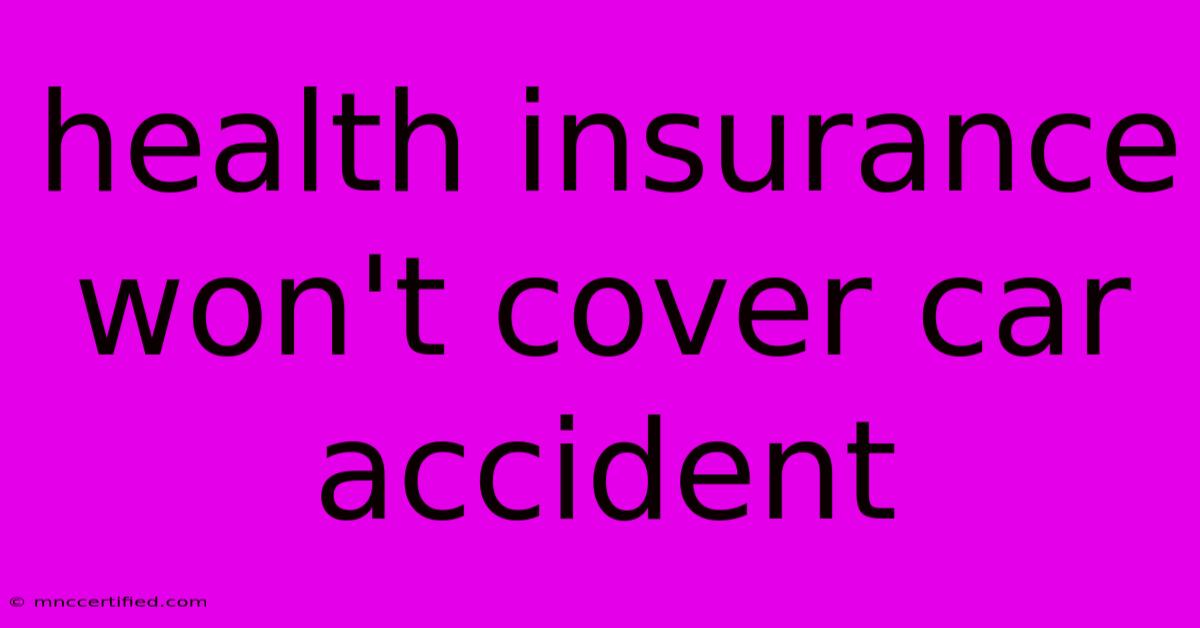Health Insurance Won't Cover Car Accident

Table of Contents
Health Insurance and Car Accidents: What You Need to Know
Car accidents are unfortunately a common occurrence, and when they happen, you may find yourself dealing with injuries and medical bills. Many people mistakenly believe that their health insurance will cover all their medical expenses in such situations. However, health insurance typically does not cover all the costs associated with a car accident. This is because car accidents are primarily covered by auto insurance.
What Does Health Insurance Cover After a Car Accident?
While health insurance won't cover the entire spectrum of car accident expenses, it can help with certain medical costs:
- Emergency Room Treatment: If you are seriously injured in a car accident and require immediate medical attention, your health insurance will cover the costs of emergency room visits, ambulance transportation, and necessary medical procedures.
- Follow-up Care: Your health insurance policy might cover follow-up appointments with doctors, physical therapy, and other treatments related to your injuries.
- Prescription Medications: Health insurance typically covers prescription medications prescribed by your doctor for injuries sustained in a car accident.
What Health Insurance Won't Cover After a Car Accident
While health insurance provides some coverage, it's important to understand its limitations:
- Lost Wages: Health insurance doesn't compensate you for lost income if you are unable to work due to your injuries.
- Pain and Suffering: Your health insurance policy won't cover compensation for emotional distress, pain, or suffering experienced as a result of the accident.
- Property Damage: Health insurance does not cover damage to your vehicle or other property caused by the accident.
- Legal Expenses: If you need to hire a lawyer to pursue legal action, your health insurance won't cover those costs.
What About Auto Insurance?
Auto insurance plays a crucial role in covering expenses related to car accidents. Here's how:
- Personal Injury Protection (PIP): This coverage helps pay for medical expenses, lost wages, and other related costs, regardless of who was at fault in the accident.
- Collision Coverage: If your car is damaged in an accident, collision coverage can help pay for repairs or replacement.
- Liability Coverage: If you are at fault for the accident, liability coverage protects you financially against claims made by the other party for medical expenses, lost wages, and property damage.
What To Do After a Car Accident
Following these steps can help you navigate the aftermath of a car accident:
- Seek Immediate Medical Attention: Your health is paramount. Get checked out by a medical professional, even if you feel fine.
- Contact Your Insurance Company: Inform your auto insurance company about the accident as soon as possible.
- Document Everything: Take pictures of the accident scene, your injuries, and any damage to your vehicle. Gather contact information from witnesses.
- Keep a Detailed Record: Maintain a log of all medical appointments, treatments, and expenses.
Key Takeaways
- Health insurance is not a primary source of coverage for car accident expenses.
- Auto insurance is your primary source of financial protection for car accidents.
- Understanding your coverage is vital: Review your health and auto insurance policies carefully.
- Be prepared: Having comprehensive auto insurance and knowing your rights and options can help you navigate a difficult situation.
By understanding how your health and auto insurance work in the event of a car accident, you can better prepare yourself for potential financial challenges.

Thank you for visiting our website wich cover about Health Insurance Won't Cover Car Accident. We hope the information provided has been useful to you. Feel free to contact us if you have any questions or need further assistance. See you next time and dont miss to bookmark.
Featured Posts
-
How Quickly Does Composite Bonding Stain
Nov 07, 2024
-
Bowel Cancer Warning Morning Stars Story
Nov 07, 2024
-
West Indies Vs England Live Score Englands 47th Over
Nov 07, 2024
-
America Vs Pachuca Apertura 2024 Final Score
Nov 07, 2024
-
How To Get Insurance To Pay For Paint Job
Nov 07, 2024